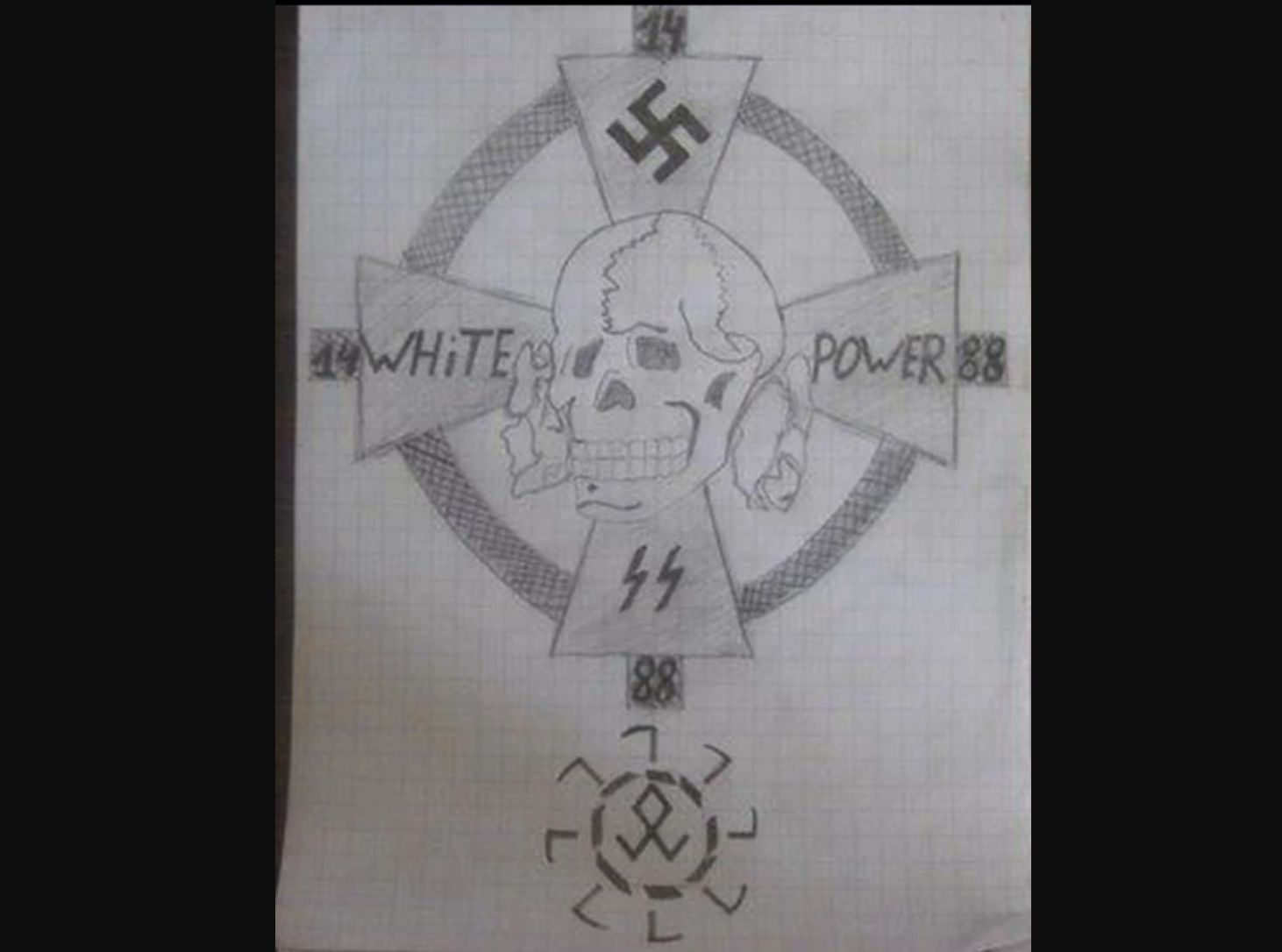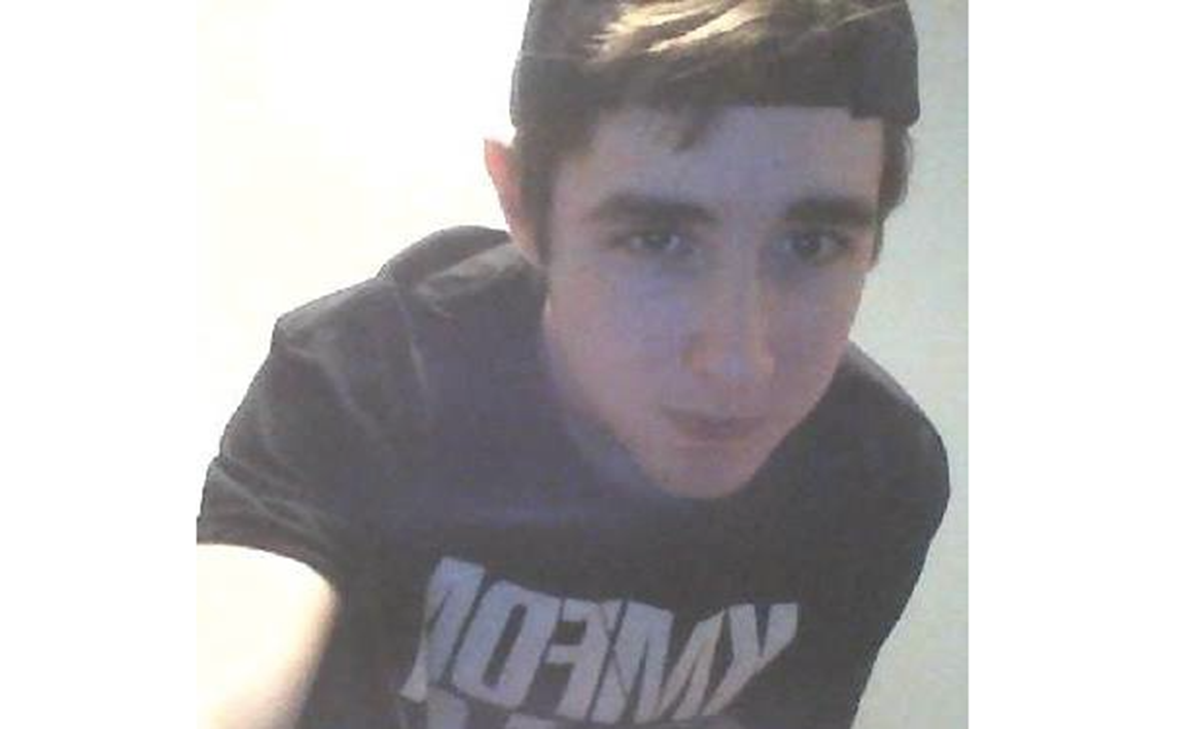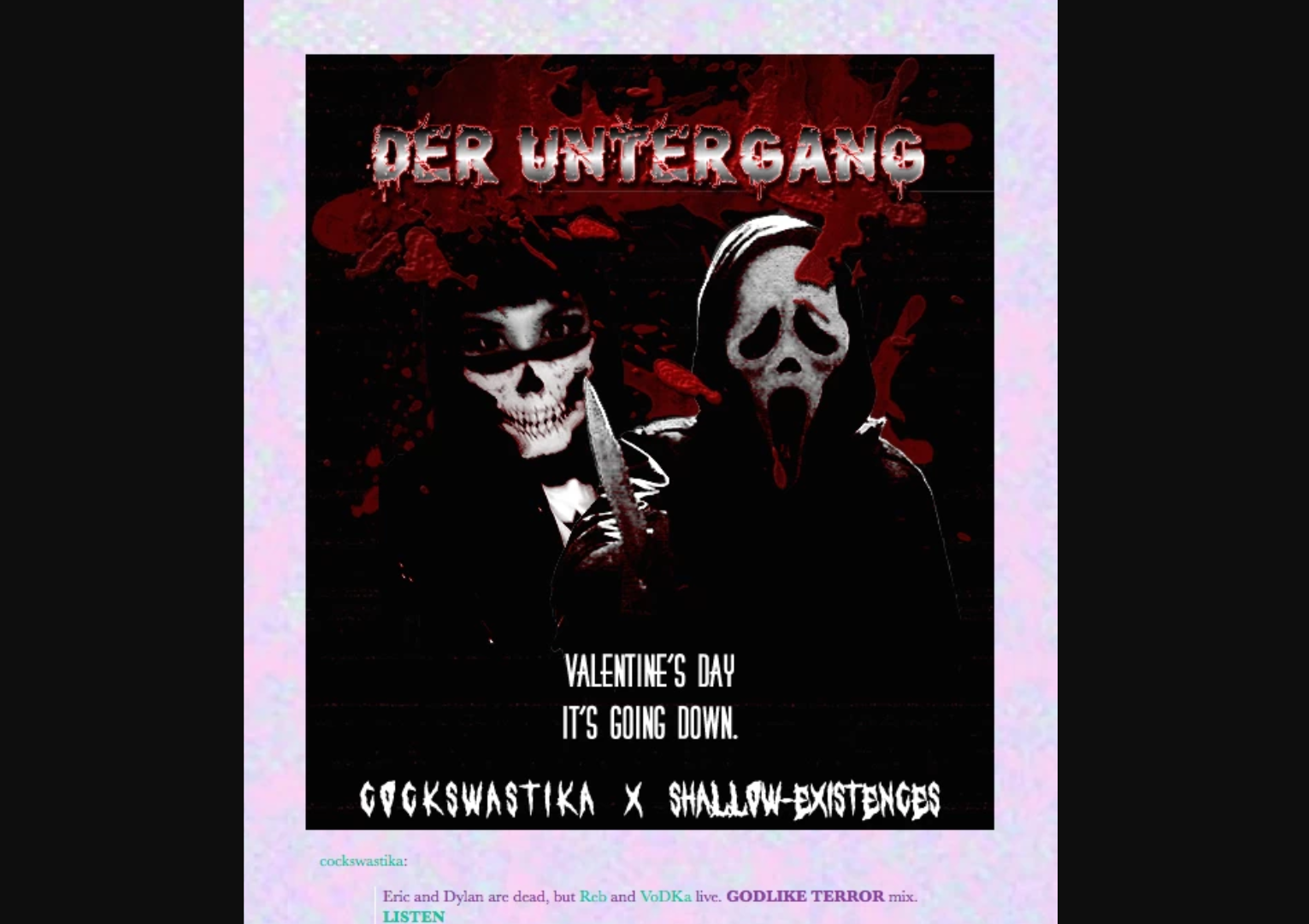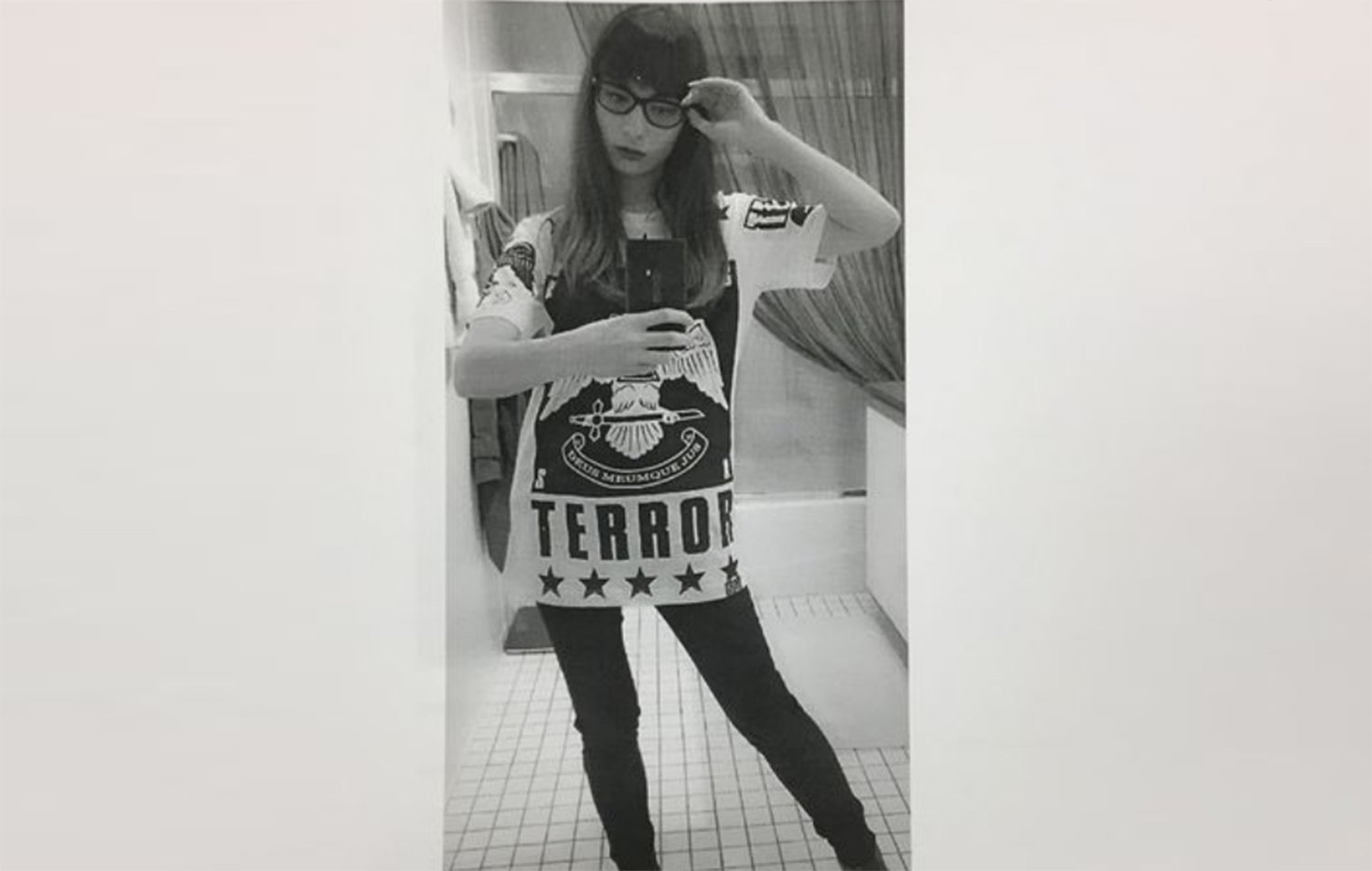This article originally appeared on VICE Canada.
It all started with a Columbine meme.
The meme showed the dead bodies of Eric Harris and Dylan Klebold as they laid sprawled in the Columbine library. Under the gore read a caption—”I can’t live without my friends.” When Lindsay Souvannarath—the meme’s proud creator—posted her artwork to Tumblr, she used the hashtag #columbine.
Meanwhile, almost 2,000 kilometers [1,243 miles] away from Souvannarath’s Illinois home, James Gamble was trawling through Tumblr in his bedroom in Halifax, Nova Scotia. Using the same hashtag as Souvannarath, Gamble soon came across her post, was impressed by it, and followed her.
The two hit it off instantaneously and an online romance blossomed, with the two sexting and planning to meet up. Within seven weeks, Souvannarath would board a plane to Halifax en route to meet Gamble. Once together, they planned to lose their virginity to each other and, the next day, commit what they hoped to be one of the most horrific mass killings in Canadian history.
Gamble and Souvannarath would never meet—their plan to firebomb and shoot up the Halifax Shopping Center was thwarted by a timely Crime Stoppers tip and ended with Souvannarath serving a life sentence and Gamble taking his own life. Now, for the first time since being brought to the public’s attention four years ago, Lindsay Souvannarath decided to speak out. The would-be killer gave a phone interview to a true crime podcast—the Nighttime Podcast hosted by Halifax native Jordan Bonaparte.
It’s a chilling listen, as Souvannarath describes planned murders and neo-Nazi beliefs with the same inflection as one would talk about a boring day at the office.
"She didn't pull punches, she was straight and just told the story,” Bonaparte told VICE of his conversations with Souvannarath. "Some of the things she would say, almost in passing, would make the hair on the back of my neck stand up and terrified to go to a mall again but, to her, it was no big thing."
In doing so, she gives us insight into one of the strangest Canadian crimes in recent years.
An Extremely Online Crime
The role the internet played in this crime cannot be overstated. Online the two were able to meet through Columbine jokes, indulge in their darkest fantasies, and plan a mass shooting on a messaging app.
The young woman had a hard time creating connections offline and spent a lot of time surfing the internet. When tracking Souvannarath’s path to a life sentence, it’s her secretive online persona that sought out other outsiders and extreme ideas, which led her toward violent fantasy. It’s how the mixed race daughter of a Laotian father and Eastern European mother could find herself a devout neo-Nazi.

“[The neo-Nazi beliefs] just started by chance on this art website when I came across this one painting and thought, whoa, that’s a really cool painting. So I decided to like and comment on it and talk to the artist a little,” said Souvannarath on the podcast. “The artist just happened to be a national socialist.”
Souvannarath, who said this all started when she was 16, would follow this artist and become more exposed to his beliefs and neo-Nazi artwork over time. This art was her gateway into “meeting more national socialists,” bonding with them, and tumbling head-over-heels into communities where hate is celebrated.
From here, Souvannarath got deeper into the online neo-Nazi community, accepted the ideology, and eventually found herself on the most infamous extreme-right forum, Iron March—a site that would eventually radicalize its own murderers. Here, she allegedly had an online relationship with the site’s founder, an influential neo-Nazi figure, Alexander Slavros—a relationship Souvannarath would seemingly describe in the podcast as, “a really stupid superficial relationship that I probably took more seriously than I should have.” She would eventually end up running her own blog called Cockswastica, where she would post about her beliefs.

At the same time as she was building this far-right belief system, Souvannarath was writing macabre short stories—some of which later became well-known creepypastas—including one called "If a Skull Could Blush." She decided to include a school shooting into this story, and began researching Columbine. For whatever reason, Columbine struck her in a certain way, and much like her relationships with neo-Nazis, she was able to find community with those who romanticized the killings—a group of people called Columbiners.
“When I started posting in the Columbine tag and kind of networking with the other people posting there, I just made so many friends there that I had so much in common with. We all connected over this one thing, there were other things too. It just became very significant for me.”
This isn’t to say that Souvannarath was a death worshipping neo-Nazi in her regular life—instead, in court documents, her family described her as someone who would “obey rules to a fault sometimes.” Like many of us, Souvannarath was a different person online and offline.
“It's almost like a different person. I think if this crime had have been planned, and have all happened on the telephone instead of on Facebook Messenger,” said Bonaparte. “I think this would have been different. I don't think any of this would have happened."
Primed for the Attack
After finding this community, Souvannarath would idealize Eric Harris and Dylan Klebold and soon start creating memes to iconize them. It was here she met James Gamble, a depressed 19-year-old man from Halifax who was on a similar journey involving neo-Nazis and Columbiners as Souvannarath. Gamble, fatefully liked that post and followed her, then she followed him back and messaged him. She said that the two originally began chatting as friends but, as they were both Columbine fans, when the topic of them meeting and committing a mass killing came up Souvannarath “started feeling strongly attracted to him.”

“We were originally talking about our clothes and how we liked to wear clothes that intimidated people. I asked him if he kind of had any regular hangouts so I could show up and people would be like ‘oh God, there’s two of them now,’” said Souvannarath. “He kind of came up the idea of maybe carrying out the attack while we were dressed in those clothes and I found myself on board with it.”
For the seven and a half weeks leading up to the plot the two spoke every day, sometimes for multiple hours on Facebook Messenger—where their relationship almost entirely existed. Amid the typical things a new long-distance couple would do, like sexting and sending photos, the two planned their attack. As Bonaparte, who has read the entire Facebook Messenger log puts it, the rate it went from “quickly they go from, ‘oh you're kind of cute’ to 'yes I will get on a plane and we'll use your parents guns and go shoot up the mall and kill each other like Eric and Dylan from Columbine,’” is incredibly fast. They were essentially primed for this moment.
The two continued to build each other up online talking about not just the crime itself but the legacy they would leave behind. Over time, it seems she began to disassociate from reality and began to believe that she and Gamble were being taken over by the spirit of Eric Harris and Dylan Klebold.
“I believed I had the mind of Eric Harris inhabiting my body somehow, and that as time went on and as I was planning things more and more he started taking over me more and more,” said Souvannarath.
The two discussed where to do the crime. They discussed a library, but that was too similar to Columbine; an elementary school, but that might send the wrong message; a hospital, Souvannarath said this sounded fun but decided it was pointless. Finally, they decided on the mall as it was “the most fun” and “like it would be a protest against capitalism, consumerism, and greed.” Furthermore, the mall would allow them to find their “ideal victims”—for James, “middle-aged Christian woman;” and for Souvannarath, who was obsessed with eugenics, “anybody that was particular dysgenetic looking.”

The agreed statement of facts in Souvannarath’s case lays out the plot: “On February 14, 2015, they would go to the area of the food court of the Halifax Shopping Center, and throw Molotov cocktails. Next, Gamble and Ms. Souvannarath would indiscriminately shoot whoever was there, with a lever action .308 hunting rifle, and a single action 16 gauge shotgun respectively. Gamble would kill any wounded persons with a hunting knife. Their intention was to inflict as many casualties as their ammunition would allow.”
The shooting would only end with Souvannarath and Gamble killing themselves on the count of three—one final homage to Columbine. The weapons they would use were to be Gamble’s parents guns and he would kill his mother and father the night before Souvannarath arrived. Once she was in Halifax she would stay with Gamble, they would lose their virginity to each other, and then, the next day, they would pull off their plot. They were to be helped by Gamble’s best friend Randall Shepherd—he is currently serving a ten-year prison term for his role in the plot. In the end, they hoped they would inspire more of these shootings and be remembered like the Columbine shooters.
For the lovebirds though, perhaps more importantly than the details of the shootings was the aesthetics that surrounded it—the clothing they wanted to wear and the message they wanted to get across with the killings. Their clothing was planned meticulously intended to pay homage to Harris and Klebold but give them an identity all their own.

Then they had to pick a day, at first it was February 1, 2015, but that had to be changed when Souvannarath didn’t buy a ticket in time before the price skyrocketed. With that pushed back, Gamble suggested, well, why not Valentine’s Day, as it would add an extra layer to the crime. Souvannarath agreed and booked a ticket.
‘It’s Going Down’
Online the two began to leave bread crumbs hinting at their actions, the most infamous being a photo of the two—one in a scream mask, the other a skull bandana that’s since become associated with Atomwaffen—with the caption “Valentines Day it’s going down.” Souvannarath even began to write a suicide note called Der Untergang which would auto-post the day after the killings—it started with the line, “perhaps you have already heard the news of a mass shooting in Halifax.”
Souvannarath and Gamble would never meet in-person.
The plan began to fall apart the minute they put it into motion. The two were, to put it lightly, shitty criminals. They didn’t keep their plot very secret, boasting about it to several people—meaning a Crime Stoppers tip about the two planning a shooting was called in. While Souvannarath was able to sneak out of her parents house and board a plane to Halifax, she didn’t expect to be flagged by Canadian customs for arriving with no return flight, practically no luggage and didn’t know what to tell the border officials.
“They went through my items and didn’t really like what I had with me. They didn’t like my books, they didn’t like the little hat I had with me that had a swastika on it,” said Souvannarath. “From there, the police actually came and arrested me for uttering threats.”
At this point, Gamble was already dead. While Souvannarath was still in the air, the police went to Gamble’s house to confront him about the tip. His parents had confirmed that he was home and police surrounded the house, called in, and told him to exit. A single gunshot rang out and when they entered the home, police found Gamble had turned the gun on himself. He did not kill his parents, which he was planning to do that evening.
She said she found out her online boyfriend was dead after answering a cop’s question with “I don’t know, ask James;” one of them told her he “blew his head off.”
The plot would soon be brought to the public’s attention and become a giant story. In the end, Souvannarath would plead guilty to charges of conspiracy to commit murder, conspiracy to commit arson, illegal possession of weapons for dangerous purposes against the public, and making threats over social media. She pleaded guilty in 2017 and was sentenced to life in prison without parole for ten years. She’s currently appealing the sentence.
While only four years ago, the plot to kill as many as they can was one of the first cases to force the public to understand online radicalization, extreme subcultures, and the ever-strange world of extreme-right communities. In the end it’s a crime that showcased the power of the internet to build communities in the worst way possible.
"You hear the cliché that someone is gasoline and someone is the match? In this case that's it absolutely, except Lindsay wasn't gasoline she was a old wooden building filled with oily rags, and James Gamble wasn't a match, he was a raging inferno,” said Bonaparte.
“It was the perfect pair to fit together to launch this disturbed plot and only by the grace of God it didn't happen.”
You can listen to the Nighttime Episodes featuring Bonaparte’s interviews with Souvannarath here.
Sign up for our newsletter to get the best of VICE delivered to your inbox daily.
Follow Mack Lamoureux on Twitter.
from VICE https://ift.tt/2GUqUGJ
via cheap web hosting
No comments:
Post a Comment